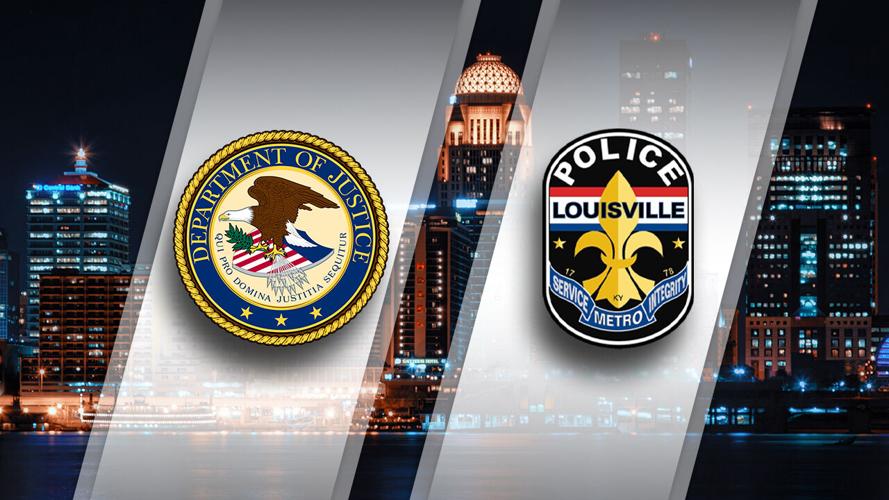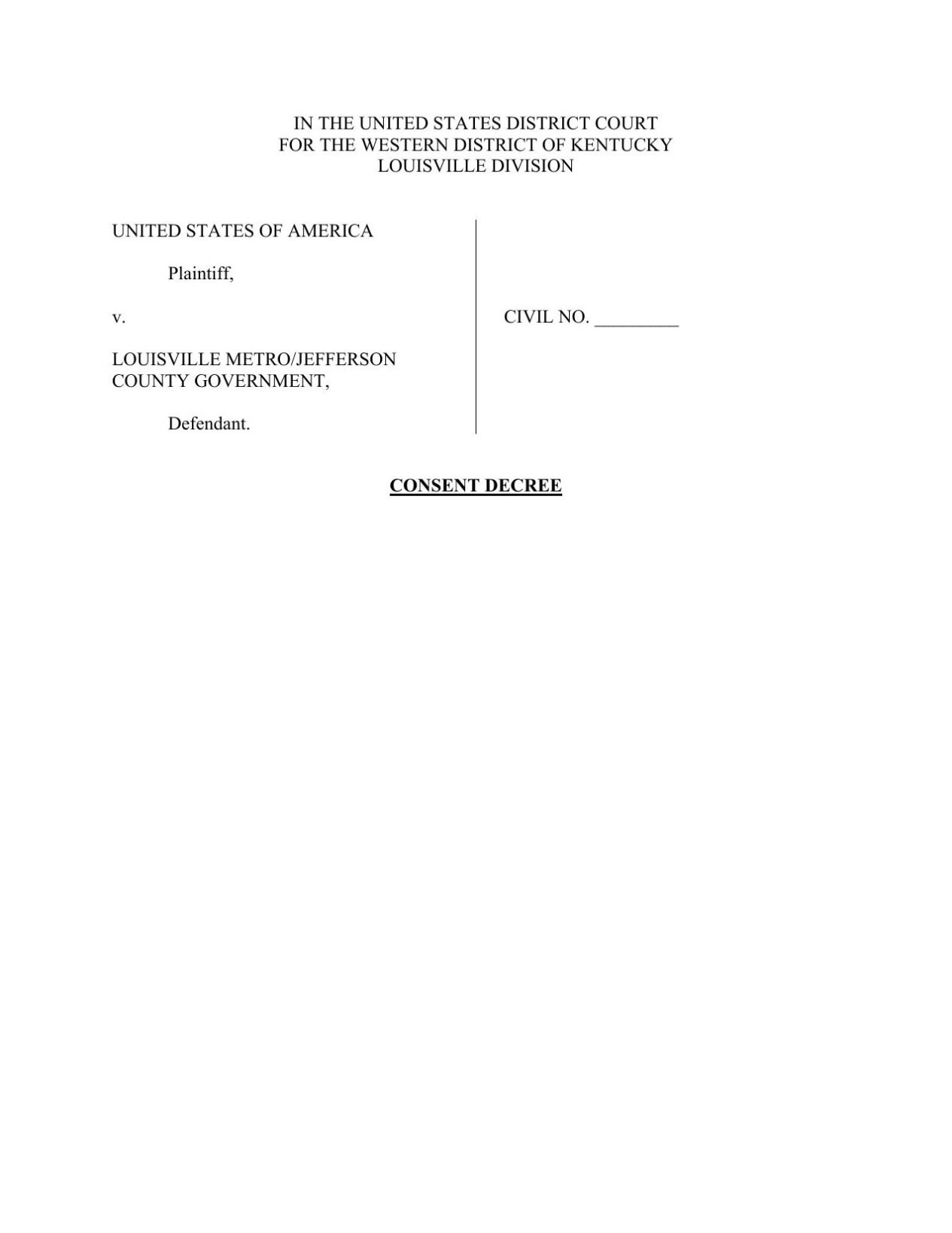LOUISVILLE, Ky. (WDRB) -- Louisville Metro Government urged a federal judge Tuesday to sign a so-called "consent decree" that would ensure court oversight of the agreement between Metro government and the U.S. Department of Justice that lays out sweeping reforms of Louisville police.
The move comes as the federal judge has raised skepticism about the court's role in the agreement, and President Donald Trump's administration has said it would put a halt to consent decrees that were finalized by the Biden administration within the last 90 days, which would include Louisville and Minneapolis.
During Trump's first term, the Justice Department attempted to upend an Obama-era consent decree for Baltimore's police department that hadn't yet been approved by a judge by the time the new administration took over. But that effort ultimately failed, with a federal judge in Maryland saying the Justice Department's move to scrap the agreement came too late, according to media reports.
In a previous interview with WDRB News, Louisville Metro Police Chief Paul Humphrey said the city has negotiated an agreement with the Department of Justice and "regardless of whether it's under a consent decree or oversight of federal government ... is going to be striving toward constant improvement."
It is unclear if U.S. District Court Judge Benjamin Beaton will sign the consent decree, which would ensure federal oversight and monitoring of the agreement between police and the DOJ.
On Jan. 13, Beaton expressed concern that, if he approves the consent decree, a judge would be responsible for "day-to-day operations" of the police force instead of city officials and asked if there was a "less intrusive" remedy of reforming the police department without court oversight and monitoring.
But in its motion this week, the city argued in support of Beaton signing the consent decree.
"Louisville Metro continues to support entry of the proposed Consent Decree as it implements reforms to which Louisville Metro is committed and avoids costly and wasteful litigation," according to court documents. "From Louisville Metro's perspective, the proposed Consent Decree is an effective mechanism to keep the reform process on track and to provide third-party validation of Louisville Metro's progress by means of an independent monitor that will report to the public."
In addition to questioning the need for a consent decree, Beaton has repeatedly expressed frustration with the DOJ for either not having information or refusing to turn over evidence used in the report, such as how many officers were found to have violated lethal force policies.
In the city's motion, police attempted to answer some of the questions Beaton had for the DOJ, reporting that there were three incidents in which violations of the use of deadly force policy were sustained and 54 incidents in which violations of the non-lethal use of force policies were sustained during the time-period looked at.
The city also answered other questions the judge had directed to the DOJ.
While the city maintains that it does not agree with all of the findings by the DOJ, it does "support continuous evaluation and improvement and recognizes the importance of public trust and confidence in the progress of police reform."
The city and the DOJ have already agreed to the terms to resolve the pending litigation and that consent "affords the court the authority to enter the decree and impose injunctive relief."
Beaton has said the consent decree would cost millions of dollars and he wasn't sure federal court involvement was warranted in this instance, especially when LMPD has already made several of the recommended changes and agreed to continue with further reforms.
"I understand that, for the DOJ, this is the way to go," he previously said. "But the fact that it has happened before (in other cities) doesn't mean it should happen here."
The 248-page DOJ report was the result of months of negotiations that began after the Justice Department concluded in 2023 that Louisville police and Metro government for years engaged in practices that violated the U.S. Constitution and federal law, including excessive use of force and searches based on invalid warrants.
The parties negotiated for nine months before agreeing to the consent decree in December.
With a court-ordered consent decree, the city or LMPD could be held in contempt if they refuse or fail to intact reforms outlined in the DOJ report. It would also fund an independent monitor who would oversee the police department's progress and report to the court.
Mayor Craig Greenberg's administration previously said it expects the consent decree will be approved by a federal judge, starting a process city officials hope will be completed in less than five years. An independent monitor who reports to the court will oversee the police department's progress.
However, Louisville Metro government and federal officials recently paused the effort to hire an outside group that would ensure the city's compliance with a sweeping police reform deal, waiting to see how Beaton will rule.
The city planned to name the monitor — typically a team of experts in policing, law and other specialties — by the spring. It has agreed to pay no more than $1.475 million annually for an initial two-year term. After five years, a U.S. District Court judge would hold a hearing on Louisville's progress.
Under the agreement, the department will revise its use-of-force and training policies, improve search warrant practices, ensure traffic stops are conducted legally, ensure the fair investigations of police misconduct and address sexual harassment allegations in the department, among other reforms.
The agreement addresses 13 specific areas, from traffic stops to officer assistance, and requires police to show "substantial compliance" with the promised changes before each section is satisfied.
The Biden administration's Justice Department announced the findings of its review March 8, 2023. That came nearly two years after the 2020 police killing of Breonna Taylor, which prompted both local and national criticism of the police department as well as months of protests.
U.S. Attorney General Merrick Garland listed myriad examples of Louisville police misconduct and crimes, such as throwing drinks at pedestrians, racial disparities in arrests and traffic stops, assaulting citizens with disabilities and calling Black people "monkeys, animal and boy."
The federal investigation into LMPD cites 63 different incidents of alleged misconduct, according to an appendix of the 90-page report the DOJ released following their roughly two-year investigation.
The investigation began after the 2020 police killing of Breonna Taylor, which prompted both local and national criticism of the police department and triggered months of protests. The federal probe cited 63 different incidents of alleged misconduct.
The city and Justice Department negotiated for nine months before agreeing to the consent decree in December.
Related Stories:
- Louisville mayor says outside supervision of police reform deal is ‘important’ however judge rules
- Louisville, feds freeze effort to hire independent monitor for police reform deal
- LMPD Chief Paul Humphrey says he is 'fully committed' to reforming department even without consent decree
- Trump's new Justice Department leadership orders a freeze on civil rights cases, including Louisville
Copyright 2025 WDRB Media. All Rights Reserved.















